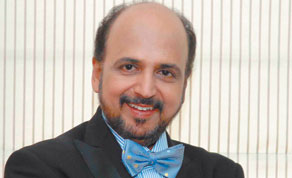 |
|
R Seetharaman |
Over 5,000 delegates are expected to participate making it the biggest ever congress conducted. Over 50 ministers from various countries are expected to participate and over 500 speakers are expected to address the gathering including top diplomats and CEOs.
Speaking in this regard, R Seetharaman, Doha Bank Group Chief Executive Officer said, “The WPC will showcase the future scope of Qatar’s energy sector. Being held at QNCC, which is the world’s first ever facility to be Gold Accredited by US Green Building Council it will focus on various themes such as exploration, innovative technologies, complementary energy sources and sustainability commitment on environment, education and governance. It is a carbon neutral event emphasising Qatar Green Economy Initiatives.
“Over 60 countries including the Opec and non-Opec nations are participating in this congress. Ahead of the Opec meeting scheduled at Vienna in December 2011 the WPC has significant relevance in the present global scenario. WPC is also developing a sustainable energy sector and has entered into agreement with Qatar Foundation on recycling techniques.”
Seetharaman also shared his outlook on the global energy markets. “World oil-consumption- GDP is expected to grow by 3.1% in 2012, compared with 3.5% in 2011. Downside risks predominate, as fears persist about the rate of global economic recovery, contagion effects of the debt crisis in the European Union, and other fiscal issues facing national governments. World consumption will grow by 1.32mn bpd to 88.4mn bpd this year, and by a further 1.44mn bpd in 2012.
“OECD countries’ total oil demand is estimated to decline by 0.59% in 2011.The non-OECD countries are expected to account for all of the world’s growth over the next two years, with the largest contributions coming from China, the Middle East, and Brazil. Projected Opec crude oil production is expected to increase by 0.5 in 2011 and 1.1mn bpd by 2012. Non-Opec supply in 2011 is forecast to increase by 0.2mn bpd and by 0.8mn bpd in 2012.
“Brazil, Canada, Colombia, the US, Ghana, and Russia are expected to be the main contributors to next year’s growth, while Norway, UK, and Mexico are anticipated to experience the largest declines. Brent crude has averaged over $111 a barrel this year, up from just over $80 in 2010, adding to manufacturing costs and leaving consumers with less disposable income – a sustained price between $70 and $80 is expected to stabilise in the present global conditions,” he said.
The Doha Bank CEO also gave an insight into the various investment projects in line in the oil and gas sector.
“Opec would spend $155bn on projects coming on stream between 2010 and 2014 and Opec is planning almost 132 projects for 2011-15 projected at an investment figure of close to $300bn. Huge investments are being made to maintain existing fields and infrastructure, develop new capacity, build pipelines and terminals, construct refineries and expand sea transportation fleets. Opec countries’ varying spare capacity is set to double in four years when it will reach 8mn bpd.”
Pointing out the significant developments in the GCC energy sector, Seetharaman highlighted the major projects underway such as the Saudi Aramco and the Japanese refining company Showa Shell pilot solar power plant, Kuwait Solar Power project, Qatar’s 12 fully solar-powered stadiums which is one of the most ambitious alternative energy projects in the region, Masdar, the Abu Dhabi government-backed renewable energy company wind turbine facility and Bahrain ‘hybrid’ power plants for solar and wind energy at a cost of around $8mn. There are various other wind and electrical power projects in the pipeline for GCC.
“Qatar hydrocarbon sector is also experiencing significant developments and Qatar recently achieved the milestone of 77mn tonnes of LNG. Qatar is to take advantage position in the global energy stage as the world’s largest LNG producer and transhipper.
“We had a significant boost in world energy sector with 1st phase of Pearl GTL being completed. Among other achievements include the four mega liquefaction trains with 100% capacity and RasGas delivering LNG cargo to Turkey. Qatar is also playing an increased role in aiding Japan and the Asia Pacific markets with increased export of natural gas. Qatar’s position is being strengthened to a greater extent with major conferences such as WPC and GECF being held in the country,” Seetharaman said.

